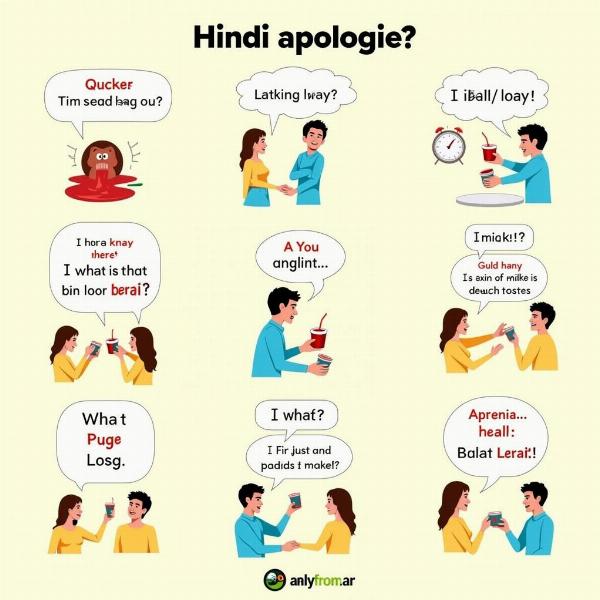Understanding how to apologize sincerely in Hindi is crucial for navigating social interactions and building strong relationships. While a simple “I am sorry please forgive me” conveys the basic sentiment, exploring the nuances of Hindi allows for a more profound and culturally appropriate expression of regret. This article delves into various ways to say “I am sorry please forgive me” in Hindi, exploring the cultural context and offering practical examples.
Different Ways to Say “I am Sorry Please Forgive Me” in Hindi
The most direct translation of “I am sorry please forgive me” is “मुझे माफ़ करना, कृपया मुझे क्षमा करें” (mujhe maaf karna, kripya mujhe kshama karen). However, this translation can sound formal and even a bit stiff in everyday conversation. Here are some more common and natural ways to express your apology:
- माफ़ करना (maaf karna): This is the most common and versatile way to say “sorry” in Hindi. It’s suitable for a wide range of situations, from minor inconveniences to more serious offenses.
- क्षमा करना (kshama karna): This is a more formal and respectful way to apologize, often used when addressing elders or someone in a position of authority.
- मुझे माफ़ कर दो (mujhe maaf kar do): This is a more informal and casual way to say “forgive me,” often used among friends and family.
- माफ़ी चाहता हूँ/चाहती हूँ (maafi chahta hoon/chahti hoon): This translates to “I seek forgiveness” and is a more heartfelt way to express remorse. Use “hoon” if you are male and “chahti hoon” if you are female.
Choosing the Right Apology in Hindi
The best way to apologize depends on the context and your relationship with the person you’ve offended. Consider the severity of the offense and the level of formality required. For example, “maaf karna” might suffice for accidentally bumping into someone, while “maafi chahta/chahti hoon” would be more appropriate for a more serious transgression.
Cultural Nuances of Apologizing in India
Indian culture places a high value on respect and humility. When apologizing, it’s important to be sincere and avoid making excuses. Nonverbal cues, like lowering your head or folding your hands, can also convey genuine remorse. plz forgive me meaning in hindi
Beyond “I Am Sorry Please Forgive Me”: Expressing Regret in Hindi
Sometimes, a simple apology isn’t enough. You might need to express the reason for your apology or assure the person that you won’t repeat the mistake. Here are some phrases you can use:
- गलती से हो गया (galti se ho gaya): “It happened by mistake.”
- मुझसे गलती हो गई (mujhse galti ho gayi): “I made a mistake.”
- मैं ऐसा दोबारा नहीं करूँगा/करूँगी (main aisa dobara nahin karunga/karungi): “I won’t do it again.” (Use “karunga” if you are male and “karungi” if you are female.)
- मुझे बहुत अफ़सोस है (mujhe bahut afsos hai): “I am very sorry” or “I deeply regret it.” meaning of sorry in hindi
Practical Examples of Apologies in Hindi
Here are some examples of how to use these phrases in different situations:
-
Scenario: You accidentally stepped on someone’s foot.
- Apology: “माफ़ करना (maaf karna)” or “अरे, माफ़ करना (arey, maaf karna)” (Adding “arey” makes it sound more casual.)
-
Scenario: You forgot a friend’s birthday.
- Apology: “यार, मुझे माफ़ कर दे। मैं तुम्हारा जन्मदिन भूल गया/गई। मुझे बहुत अफ़सोस है।” (Yaar, mujhe maaf kar de. Main tumhara janamdin bhul gaya/gayi. Mujhe bahut afsos hai.) – “Friend, please forgive me. I forgot your birthday. I am very sorry.” (Use “gaya” if you are male and “gayi” if you are female.)
-
Scenario: You were late for an important meeting with a senior colleague.
- Apology: “महोदय/महोदया, क्षमा करें, मुझे देर हो गई। मैं ऐसा दोबारा नहीं करूँगा/करूँगी।” (Mahoday/Mahodaya, kshama karen, mujhe der ho gayi. Main aisa dobara nahin karunga/karungi.) – “Sir/Madam, I apologize, I am late. I won’t do it again.” (Use “karunga” if you are male and “karungi” if you are female.) sorry for that hindi meaning
 Apologizing in Different Situations
Apologizing in Different Situations
Conclusion
Saying “I am sorry please forgive me” in Hindi goes beyond a simple translation. Understanding the nuances of the language and the cultural context allows for a more sincere and effective apology. By choosing the right words and incorporating appropriate nonverbal cues, you can navigate social situations with grace and build stronger relationships. why are you sorry meaning in hindi i apologize meaning in hindi
FAQ
-
What is the most common way to say sorry in Hindi?
The most common way to say sorry in Hindi is “maaf karna (माफ़ करना)”. -
How do I apologize to an elder in Hindi?
Use “kshama karna (क्षमा करना)” for a more respectful apology to an elder. -
What can I say besides “sorry” to show remorse?
You can say “mujhe bahut afsos hai (मुझे बहुत अफ़सोस है)” meaning “I deeply regret it.” -
How do I say “I won’t do it again” in Hindi?
Say “main aisa dobara nahin karunga/karungi (मैं ऐसा दोबारा नहीं करूँगा/करूँगी).” Use “karunga” if you are male and “karungi” if you are female. -
Are there any non-verbal ways to apologize in India?
Yes, folding hands (Namaste) and slightly bowing your head are common non-verbal apologies.
Meaning-Hindi.in is your premier source for professional Hindi translation services, specializing in business, legal, technical, website localization, educational, and other specialized fields. We offer accurate and culturally sensitive translations to bridge the communication gap between languages. Contact us today to discuss your translation needs! Email: [email protected], Phone: +91 11-4502-7584. Let Meaning-Hindi.in be your trusted partner for all your Hindi translation requirements.